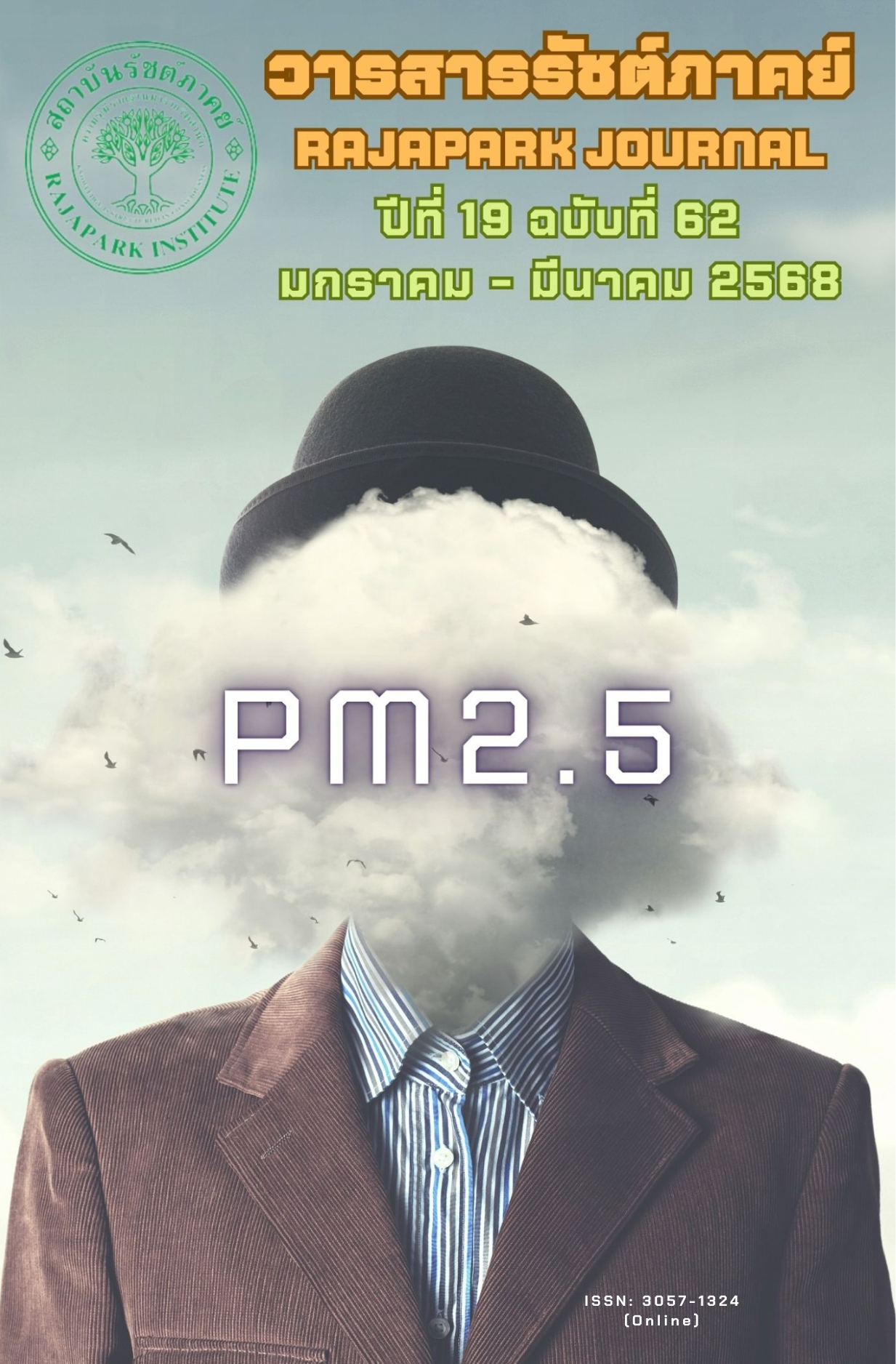โอกาสและความท้าทายด้านจริยธรรมสื่อดิจิทัลในยุคปัญญาประดิษฐ์
Main Article Content
บทคัดย่อ
การศึกษาวิจัยนี้มีวัตถุประสงค์เพื่อศึกษาการใช้งานปัญญาประดิษฐ์ในอุตสาหกรรมสื่อและผลกระทบที่
เกิดขึ้นกับผู้ชมในภาพกว้าง โดยใช้วิธีวิเคราะห์เอกสารและสัมภาษณ์เชิงลึกกับผู้เชี่ยวชาญในอุตสาหกรรมกระจายเสียงและโทรทัศน์ในเขตกรุงเทพและปริมณฑลระหว่างเดือนมิถุนายนถึงธันวาคม พ.ศ. 2567 ผลการวิจัยชี้ให้เห็นว่าปัญญาประดิษฐ์ได้เปลี่ยนแปลงภูมิทัศน์ของสื่ออย่างรวดเร็ว โดยส่งผลต่อการเปลี่ยนแปลงในทุกมิติของแนวคิดการสื่อสาร (ผู้ส่งสาร, สาร, ผู้รับสาร, ช่องทาง) ซึ่งนำเสนอทั้งโอกาสและความท้าทาย โดยเฉพาะอย่างยิ่งในด้านจริยธรรมสื่อซึ่งมีความท้าทายมากกว่าโอกาสสะท้อนถึงความจำเป็นในการกำกับดูแลและการสร้างความตระหนักรู้ โดยมีความท้าทายด้านจริยธรรมในประเด็นสำคัญ ได้แก่ การละเมิดลิขสิทธิ์ ข้อมูลเท็จ/บิดเบือน อคติในการประมวลผล และความเป็นส่วนตัว/ความปลอดภัย สำหรับโอกาสที่เกิดจากปัญญาประดิษฐ์ในอุตสาหกรรมสื่อ ได้แก่ การเพิ่มประสิทธิภาพเนื้อหา การขยายช่องทางการสื่อสาร และการสร้างประสบการณ์สื่อที่สมจริงยิ่งขึ้น การวิจัยนี้มีข้อเสนอแนะต่อหน่วยงานกำกับดูแลสื่อควรเร่งรัดพัฒนากรอบกฎหมาย นโยบาย และกรอบจริยธรรมสื่อในการใช้งานปัญญาประดิษฐ์อย่างมีธรรมาภิบาล รวมถึงการประยุกต์ใช้เครื่องมือด้านปัญญาประดิษฐ์สำหรับตรวจสอบและคัดกรองเนื้อหาสื่อ และเสริมสร้างการรู้เท่าทันสื่อให้ภาคประชาชน นอกจากนี้ ผู้ประกอบกิจการสื่อและผู้ผลิตสื่ออิสระควรมีส่วนร่วมในการกำหนดจริยธรรมสื่อในการใช้งานปัญญาประดิษฐ์ เพื่อให้เกิดแนวปฏิบัติที่ชัดเจน สามารถตรวจสอบและป้องกันการละเมิดจริยธรรมได้
Article Details

อนุญาตภายใต้เงื่อนไข Creative Commons Attribution-NonCommercial-NoDerivatives 4.0 International License.
ทัศนะและความคิดเห็นที่ปรากฏในวารสาร ถือเป็นความรับผิดชอบของผู้เขียนบทความนั้น และไม่ถือเป็นทัศนะและความรับผิดชอบของกองบรรณาธิการ
เอกสารอ้างอิง
Diawkee, T. (2016). Morality and ethics of media for presenting news in digital era. Journal of Communication and Management NIDA, 2(2), 125-143.
Consumer Council of Thailand. (2024, March 23). AI era, Consumer Council invites you train your “uh-oh” glands before sharing to prevent right violations. https://www.tcc.or.th/23032567_aipersonaldataprotection/
Data Protection Excellence Network. (2024, March 01). AI Governance Professional-IS that a real job?. https://www.dpexnetwork.org/articles/ai-governance-professional-is-that-a-real-job
Digital Tips. (2023, March 18). What is user-generated content (UGC) and why is it important for branding?. https://thedigitaltips.com/blog/marketing/ugc/
Electronic Transactions Development Agency. (n.d.). AI ethics guideline. https://www.etda.or.th/getattachment/9d370f25-f37a-4b7c-b661-48d2d730651d/Digital-Thailand-AI-Ethics-Principle-and-Guideline.pdf.aspx?lang=th-TH
Electronic Transactions Development Agency. (2024). Guidelines for applying Generative AI with good governance for organizations. https://www.etda.or.th/th/Useful-Resource /GovernanceGuideline_v1.aspx
Fitzgerald, D. (1995, October 28). The debate continues. Editor & Publisher, 11-12.
Gilchrist, K. (2024, January 10). Election disruption from AI poses the biggest global risk in 2024, Davos survey warns. https://www.cnbc.com/2024/01/10/wef-ai-election-disruption-poses-the-biggest-global-risk-in-2024.html
NIST. (n.d.). AI Risk Management Framework. https://www.nist.gov/image/ai-risk-management-framework
Offcom. (2023). Online Safty-what is ofcom’s role, and what does it mean for you?. https://www.ofcom.org.uk/online-safety/illegal-and-harmful-content/online-safety-ofcom-role-and-what-it-means-for-you
Ofcom. (2024). Ofcom’ strategic approach to AI 2024/25. https://www.ofcom.org.uk/__data/assets /pdf_file/0021/281622/Ofcoms-strategic-approach-to-AI.pdf
Office of the National Broadcasting and Telecommunications Commission (NBTC). (2024). NBTC annual report 2030. https://www.nbtc.go.th/Information/AnnualReport/65888.aspx
Omdia. (2568). Online video intelligence database. https://omdia.tech.informa.com/
Phakdee, M. (n.d.). Smart Digital Industrial Organization and Management. BPK Printing.
Post Today. (2024, January 6). Famous writers and journalists sue Open AI + Microsoft for “outrageously” taking their work to train AI. https://www.posttoday.com/lifestyle/704113
Rittipalin, J., & Thiemnara, T. (2024). Opportunities and challenges of artificial intelligence in the broadcasting and television industry. https://broadcast.nbtc.go.th/data/academic /file/670900000001.pdf
Stanford University. (2024). Artificial Intelligence Index Report 2024. https://aiindex.stanford.edu/wp-content/uploads/2024/05/HAI_AI-Index-Report-2024.pdf
Thai PBS. (2024, October 16). How AI is used in the current media industry. https://www.thaipbs.or.th/now/content/1729
The Malicious Use of Artificial Intelligence: Forecasting Prevention and Mitigation. (2018, February). https://arxiv.org/pdf/1802.07228
Mukharak, T., Srinuanpan, B., Srinuanpanand, C., & Chamnian, K. (2023). Ethics and Media Morality in Thai Society for News Reporting in Digital Age Case Study: Strafing in Nong Bua Lam Phu, Case of Nong
Chompoo, and Case of Ms.Tangmo, Challenge that Needs to be Resolved. Graduate Studies Journal of Nakhon Si Thammarat Rajabhat University, 1(1), 54-67. https://so15.tci-thaijo.org/index.php/gsjnstru/article/view/11
Trial. (2024 July, 30). EU AI Act: How risk is classified. https://www.trail-ml.com/blog/eu-ai-act-how-risk-is-classified
Vincent J. (2023, June 9). Open AI sued for defamation after Chat GPT fabricates legal accusations against radio host. TheVerge. https://www.theverge.com/2023/6/9/23755057/openai-chatgpt-false-information-defamation-lawsuit
Ubonrasamee, S. (2017). Media exposure, sharing and media literacy of health information on social media[Master’s thesis, Thammasat University].
Wijitjammaree, N. (2023). Communication theory. Faculty of Humanities, Kasetsart University, Thailand.
Yenchabok, P. (2003). Media literacy. Journal of Studies in the Field of Humanities, Faculty of Humanities, Kasetsart University, 11, 112-121. https://so04.tci-thaijo.org/index.php/abc/article/view/53278
Yodkhirim, S. (2017). Philosopher’s conception of ethics, morals and virtues. Journal of Philosophical Vision, 2(2), 37-53. https://so05.tci-thaijo.org/index.php/phiv/article/view/243127


